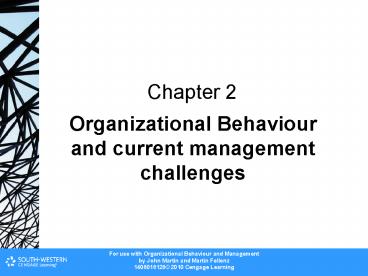Organizational Behaviour and current management challenges - PowerPoint PPT Presentation
Title:
Organizational Behaviour and current management challenges
Description:
Chapter 2 Organizational Behaviour and current management challenges Selected management concepts from the Industrial revolution Table 2.1 SCIENTIFIC MANAGEMENT ... – PowerPoint PPT presentation
Number of Views:73
Avg rating:3.0/5.0
Title: Organizational Behaviour and current management challenges
1
Chapter 2
Organizational Behaviour and current management
challenges
2
Selected management concepts from the Industrial
revolution
- Table 2.1
3
SCIENTIFIC MANAGEMENT
- Perronets time study (1760)
- Scientific management - identify what each job
involves - Design appropriate tools
- Selection training of appropriate employees
- Encourage high productivity through
incentive-based wage structure - Appropriate management of work
- Evidence of other people interested in
application of work study - Jevons - different size of spade for different
material densities - Babbage - application of strict division of
labour and incentive payments
4
ADMINISTRATIVE MANAGEMENT
Weber
Fayol
Barnard
5
THE HUMAN RELATIONS SCHOOL
- England - Industrial Fatigue Research Board
(First World War) - America Sociometry
- The Hawthorne Studies (1924-33)
- Appreciative inquiry (AI) (1987) focuses on
investigating and strengthening what is already
beneficial and successful in organizations
6
THE QUANTITATIVE SCHOOL
The impact of management science
- Quality control
- Production-planning
- Forecasting methods
- Scenario planning
7
SYSTEMS APPROACHES TO MANAGEMENT
- Originated in the biological sciences
- General systems theory
- proposed common characteristics of systems
across all disciplines and that systems contained
strong self-regulation tendencies - Continuum of complexity in systems development
- Open system
- Studies of 1940s coal mining practices
- Sociotechnical nature of effective job design
8
CONTEMPORARY MANAGEMENT CHALLENGES
- Include the challenges posed by
- global interconnectedness and the resulting
increase in linkages, scope and reach of many
organizational activities - ethical considerations and the demands for
responsible action by organizations and by
decision makers within them - the escalating levels of competition, growing
scarcity in resource supply, and the resulting
increase in productivity and performance
pressures - the cumulative and interactive effects of the
above factors and other environmental
developments on necessary organizational change
9
GLOBALIZATION AND CULTURAL DIVERSITY
- Number and variety of external international
linkages - Number of external stakeholders
- Complexity of the external environment
- Managing across different international sites
- Variety of procedures and task requirements
- Cultural diversity within organizations
10
ETHICS AND CORPORATE SOCIAL RESPONSIBILITY
- Ethical perspectives in organizations
- Utilitarian approach - is grounded in the concept
of utility or usefulness - the needs of others
should determine ones own behaviour. - Act utilitarianism - suggests that every dilemma
should be regarded on its own merits. - Rule utilitarianism - requires rule frameworks to
be created which can allow individuals to
identify appropriate courses of action in
specific contexts. - Contract approach - grounded in the notion that
agreements whether they be explicit or tacit
should be honoured - Restricted contractarianism - takes the view that
every agreement entered into should be assessed
through the veil of ignorance (on the impact). - Libertarian contractarianism - holds that the
parties should be bound by any agreement
voluntarily entered into as long as it does not
conflict with the broader rules of a just society
or cause harm to others.
11
corporate social responsibility
- For managers, the role of CSR in daily management
introduces the challenge of balancing the triple
bottom line of - people
- planet
- profits
- (Elkington, 1994)
12
PERFORMANCE IMPERATIVE
- Hypercompetition - requires managers to achieve
ever more with ever less inputs and decreasing
resources, and to respond to environmental change
and organizational requirements immediately. - It brings three important challenges for
managers - Managers managing themselves
- Managers supporting others
- Managers developing and improving organizational
and environmental awareness
13
PERVASIVE ORGANIZATIONAL CHANGE
- Figure 2.2
14
Resistance to change
- Individual resistance
- Technical resistance
- Political resistance
- Cultural resistance
- Structural resistance
15
Resistance to change
- Figure 2.3
16
Resistance to change
- Figure 2.4
17
Managing Organizational Change in the
Comprehensive Framework for OB and Management in
Organizations
- Add Figure 2.5 here































